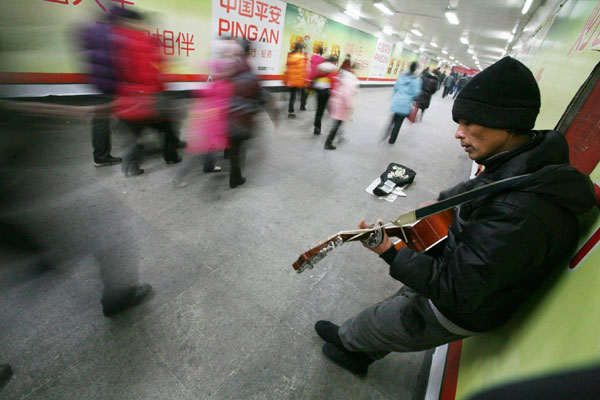
Xu Zhenfei arrives at the Dongzhimen subway station, one of downtown Beijing's node stops.
Unlike the other passengers, who exit the station to go to work, Xu's work starts in the subway.
The 28-year-old is a busker, who sings self-composed songs while strumming his guitar.
He usually leaves his home in Changping district in the city's outskirts at 7:30 am, transits at the Xizhimen subway station and arrives at the Dongzhimen stop after the office crowd at 9 am.
The good thing about there being fewer passengers on the train is that those who are around will pay attention to my songs, he says, smiling.
 |
|
Xu Zhenfei sings while playing the guitar for passengers in a subway train in Beijing. ZOU HONG / CHINA DAILY |
Xu is one of many musicians, who spend their days in the capital's subway stations or tunnels, performing for streams of commuters. Some singers are professional musicians, but many are amateurs. They have different goals. Some perform for a living, while others do it as a hobby and most are a mix of both.
Becoming a subway musician isn't for the bashful.
Xu introduces himself to the many stern-looking passengers, saying: I am Xiao Fei. I am a singer and songwriter. Singing is my dream.
Xu then starts crooning, pausing to give brief explanations at the start of each song.
I don't ask for too much. I only want to sing my own songs, he says, before singing in his coarse voice.
Some passengers toss money in his black guitar case. Many clap, and a few ask if he wrote the songs himself. Xu nods, proudly.
Xu usually performs three rounds of the same songs on the trip between the Xizhimen and Dongzhimen subway stations, which takes more than an hour. He doesn't use speakers and tries to sing as loudly as possible.
But he stops when he sees passengers, who are reading, pregnant or sleeping, to avoid disturbing them.
The native of Hengshui, Hebei province, grew up with his grandmother since age 4, when his father passed away and his mother remarried. Poverty forced him to drop out of school at age 12.
He left his hometown and cultivated a love for music.
Xu had only 50 yuan ($8) in his pocket when he first arrived in Beijing in 2000.
He worked as a waiter and often waited outside the Beijing Film Academy for temporary acting jobs. He later made friends with some singers performing in subway tunnels and started studying guitar with them.
In 2000, veteran singer-songwriter Xu Wei walked into the mainstream spotlight after 10 years of playing in tunnels and small bars a development that greatly encouraged Xu Zhenfei and other independent singers.
Xu Zhenfei saved up after half a year of working as a plaza security guard, earning 550 yuan a month. He bought his first guitar the cheapest in the shop for 300 yuan and enrolled in proper lessons.
Xu says he earns more than 500 yuan a day crooning on the subway, which is much more than he can get singing in the tunnels.
He recalls he was too shy to sing when he first started in 2009. So, he followed a friend, who was also a subway singer, and accompanied him with his guitar.
He had been approached by some record companies but isn't interested in being tied to any of them.
I don't want to have to compromise with the record companies, he says.
In March 2012, he also got a phone call from the producer of The Voice of China, Zhejiang Satellite TV Station's popular singing contest.
The producer praised Xu's vocals but wanted him to sing pop songs, which doesn't appeal to Xu.
I want to sing my own songs, he says.
Although he turned down such opportunities, which could improve his living condition, Xu feels he's fulfilling his dreams albeit slowly.
Xu recently formed a band called Bullet Cover with drummer Cao Xingle, bassist Zhang Hao and keyboardist Cao Dawei. The group plans to release their debut album, The Voice in the Corner, in 2013.
He also bought a new guitar for nearly 2,000 yuan. He says he'll make music as long as he has his guitar.
Shouting above the roar of an oncoming train on the platform, Xu explains that his ultimate dream is to become a music producer. He then steps into the train, and starts plucking his guitar and singing his heart out.
Many Chinese with musical talent dream of one day becoming professional singers. They're inspired by the success stories of singers like Ren Yueli, who's nicknamed Xidan girl because she has been singing in the tunnels of Beijing's Xidan commercial area since 2008.
In 2011, she performed at the national Spring Festival Gala.
 |
|
A grassroots singer performs in a subway tunnel at Xidan in downtown Beijing. CHINA PHOTO PRESS |
Renowned singer-songwriter Liu Huan, who was a judge of The Voice of China, says it's encouraging to see these subway artists follow their dreams. He also points out that street performers are common in Western countries, and many don't do it just to make money but, rather, because they enjoy it.
China's situation is a little different because most such musicians not only aim to entertain others but also hope to break into fame.
In the past, a singer usually would get noticed only after he or she performed on TV or at national galas. But now, people can show off their voices through many other channels, Liu says.
Like Xu, 33-year-old singer Chen Hanrang spends hours singing and playing guitar on the subway. The performance is also a way to audience-test the music of his band, Tong Zi Gu, which he founded in 2009 with four other amateurs.
Inspired by Hong Kong pop-rock band Beyond, Chen gave up a stable job at an instrument store and came to Beijing in 2009 to pursue his dream.
He met his band mates after he used trashcans for percussion during street performances they happened upon.
In January 2012, the band was invited to perform at Beijing TV Station's Spring Festival gala with other grassroots singers and groups, such as Xuri Yanggang.
We've sung in tunnels, subway trains and formal performance stages, Chen says.
No matter where the stage is, we sing about our lives and dreams.
Beijing Xing Yun Yue Zhong Culture Communication Company's executive vice-president Zhao Zheng says: China's music industry needs more people who stick to their musical dreams to share their ideas about music.
Zhao's company produced the official website of The Voice of China and assisted the singers' post-development work, such as their digital music releases.
He says shows like The Voice of China are good platforms for singers-songwriters to showcase their talents.
Some competitors may not win the contest but are still noticed by the public and that opens other avenues for them to expand their music careers.
Traditionally, record companies were the main vehicle that drove the music industry, where veteran musicians discover singers, and train and promote them, Zhao says.
But now, audiences' tastes determine the industry's direction. They like real voices and real stories.
Contact the writer at chennan@chinadaily.com.cn







